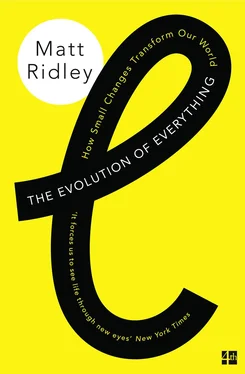Whereas Plato and Aristotle could be accommodated within Christianity, because of their belief in the immortality of the soul and the evidence for design, the Epicurean heresy was so threatening to the Christian Church that Lucretius had to be suppressed. His atheism is explicit, even Dawkinsian, in its directness. The historian of philosophy Anthony Gottlieb compares a passage from Lucretius with one from Richard Dawkins’s The Selfish Gene . The first talks of ‘the generation of living creatures’ by ‘every sort of combination and motion’; the second of how ‘unordered atoms could group themselves into ever more complex patterns until they ended up manufacturing people’. Lucretius was, carped John Dryden, at times ‘so much an atheist, he forgot to be a poet’. He talks about people ‘crushed beneath the weight of superstition’, claims that ‘it is religion breeds wickedness’ and aims to give us ‘the power to fight against the superstitions and the threats of priests’. Little wonder they tried to stamp him out.
They almost succeeded. St Jerome – keen to illustrate the wages of sin – dismissed Lucretius as a lunatic, driven mad by a love potion, who then committed suicide. No evidence to support these calumnies exists; saints do not show their sources. The charge that all Epicureans were scandalous hedonists was trumped up and spread abroad, and it persists to this day. Copies of the poem were rooted out of libraries and destroyed, as were any other Epicurean and sceptical works. Almost all traces of such materialist and humanist thought had apparently long since vanished from Europe when in 1417 a Florentine scholar and recently unemployed papal secretary named Gian Francesco Poggio Bracciolini, stumbled upon a copy of the whole poem. Poggio was hunting for rare manuscripts in libraries in central Germany when he came across a copy of De Rerum Natura in a monastic library (probably at Fulda). He sent a hastily-made copy to his wealthy bibliophile friend Niccolò Niccoli, whose transcription was then copied more than fifty times. In 1473 the book was printed and the Lucretian heresy began to infect minds all across Europe.
In his passionate attachment to rationalism, materialism, naturalism, humanism and liberty, Lucretius deserves a special place in the history of Western thought, even above the beauty of his poetry. The Renaissance, the scientific revolution, the Enlightenment and the American Revolution were all inspired by people who had to some degree imbibed Lucretius. Botticelli’s Venus effectively depicts the opening scene of Lucretius’s poem. Giordano Bruno went to the stake, with his mouth pinned shut to silence his heresies, for quoting Lucretius on the recombination of atoms and the awe with which we should embrace the idea that human beings are not the purpose of the universe. Galileo’s Lucretian atomism, as well as his Copernican heliocentrism, was used against him at his trial. Indeed, the historian of science Catherine Wilson has argued that the whole of seventeenth-century empiricism, started by Pierre Gassendi in opposition to Descartes, and taken up by the most influential thinkers of the age, including Thomas Hobbes, Robert Boyle, John Locke, Gottfried Leibniz and Bishop Berkeley, was fuelled to a remarkable extent by the sudden popularity of Lucretius.
As Lucretian ideas percolated, the physicists were the first to see where they led. Isaac Newton became acquainted with Epicurean atomism as a student at Cambridge, when he read a book by Walter Charleton expounding Gassendi’s interpretation of Lucretius. Later he acquired a Latin edition of De Rerum Natura itself, which survives from his library and shows signs of heavy use. He echoed Lucretian ideas about voids between atoms throughout his books, especially the Opticks .
Newton was by no means the first modern thinker to banish a skyhook, but he was one of the best. He explained the orbits of the planets and the falling of apples by gravity, not God. In doing so, he did away with the need for perpetual divine interference and supervision by an overworked creator. Gravity kept the earth orbiting the sun without having to be told. Jehovah might have kicked the ball, but it rolled down the hill of its own accord.
Yet Newton’s disenthralment was distinctly limited. He was furious with anybody who read into this that God might not be in ultimate charge, let alone not exist. He asserted firmly that: ‘This most elegant system of the sun, planets, and comets could not have arisen without the design and dominion of an intelligent and powerful being.’ His reasoning was that, according to his calculations, the solar system would eventually spin off into chaos. Since it apparently did not, God must be intervening periodically to nudge the planets back into their orbits. Jehovah has a job after all, just a part-time one.
That’s that then. A skyhook still exists, just out of sight. Again and again this was the pattern of the Enlightenment: gain a yard of ground from God, but then insist he still holds the field beyond and always will. It did not matter how many skyhooks were found to be illusory, the next one was always going to prove real. Indeed, so common is the habit of suddenly seeing design, after all the hard work has been done to show that emergence is more plausible, that I shall borrow a name for it – the swerve. Lucretius himself was the first to swerve. In a world composed of atoms whose motions were predictable, Lucretius (channelling Democritus and Epicurus) could not explain the apparent human capacity for free will. In order to do so, he suggested, arbitrarily, that atoms must occasionally swerve unpredictably, because the gods make them do so. This failure of nerve on the part of the poet has been known since as the Lucretian swerve, but I intend to use the same phrase more generally for each occasion on which I catch a philosopher swerving to explain something he struggles to understand, and positing an arbitrary skyhook. Watch out, in the pages that follow, for many Lucretian swerves.
Newton’s rival, Gottfried Leibniz, in his 1710 treatise on theodicy, attempted a sort of mathematical proof that God existed. Evil stalked the world, he concluded, the better to bring out the best in people. God was always calculating carefully how to minimise evil, if necessary by allowing disasters to occur that killed more bad people than good. Voltaire mocked Leibniz’s ‘optimism’, a word that then meant almost the opposite of what it means today: that the world was perfect and unimprovable (‘optimal’), because God had made it. After 60,000 people died in the Lisbon earthquake of 1755, on the morning of All Saints’ Day when the churches were full, theologians followed Leibniz in explaining helpfully that Lisbon had earned its punishment by sinning. This was too much for Voltaire, who asked sardonically in a poem: ‘Was then more vice in fallen Lisbon found/Than Paris, where voluptuous joys abound?’
Newton’s French follower Pierre-Louis Maupertuis went to Swedish Lapland to prove that the earth was flattened towards the poles, as Newtonian mechanics predicted. He then moved on from Newton by rejecting other arguments for the existence of God founded on the wonders of nature, or the regularity of the solar system. But having gone thus far, he suddenly stopped (his Lucretian swerve), concluding that his own ‘least action’ principle to explain motion displayed such wisdom on the part of nature that it must be the product of a wise creator. Or, to paraphrase Maupertuis, if God’s as clever as me, he must exist. A blazing non sequitur.
Voltaire, perhaps irritated by the fact that his mathematically gifted mistress Emilie, Marquise du Châtelet had slept with Maupertuis and had written in defence of Leibniz, then based his character Dr Pangloss in his novel Candide on an amalgam of Leibniz and Maupertuis. Pangloss remains blissfully persuaded – and convinces the naïve Candide – that this is the best of all possible worlds, even as they both experience syphilis, shipwreck, earthquake, fire, slavery and being hanged. Voltaire’s contempt for theodicy derived directly and explicitly from Lucretius, whose arguments he borrowed throughout life, styling himself at one point the ‘latter-day Lucretius’.
Читать дальше












